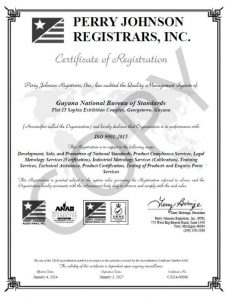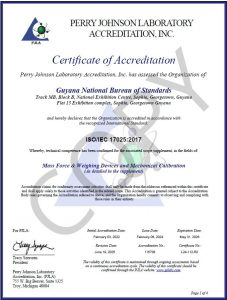Guyana’s agriculture sector is once again placed on the front burner as the breadbasket of the Caribbean as regional governments work to increase productivity and collaborative efforts in the area of food security. Over the past week, Guyanese businesspersons along with members of the Government travelled to Trinidad and Tobago to attend the T&T’s Agri-Investment Expo which featured 300 exhibitors from across the Agriculture Sector. The goal of some is to become suppliers of agricultural produce required by that and other CARICOM states by meeting their stipulated requirements. One of the easiest ways to meet the requirements of local and international markets is with the implementation of standards.
The Guyana National Bureau of Standards (GNBS) as the National Standards Body (NSB), has a total of twenty-eight (28) agriculture-related standards which can be used by micro, small, medium scale and large businesses to improve their products. Among the National Standards, which are available at the GNBS, are standards for the grading of fruits & vegetables, food safety standards, and specifications for labelling and packaging of agro-processed items.
For fresh agriculture produce, the GNBS has grading standards, which contain requirements and specifications to help producers, regulators, and consumers identify or categorize these produce. These standards help farmers or retailers to separate produce based on size, colour, freshness and a number of other characteristics. Stipulated grading requirements help to differentiate what is suitable for a particular use. Some of these standards also cover labelling, packaging, storage, hygiene and sanitation requirements.
These grading standards, once implemented, are useful for many reasons including that they clearly communicate specifications, help to determine pricing and ensure quality produce are delivered. Once utilised, the guidelines will assist businesspersons to meet the expectation of their customers, and better manage their control measures in the grading processes.
Many of the standards were also adopted from the CARICOM Regional Organisation for Standards and Quality (CROSQ), hence conformance can aid in the access of local produce to regional markets.
In addition to grading standards, business owners who are moving to add value to their products through agro-processing can also access National Standards to improve consumer confidence and overall profits. These standards include Specifications for Jams and Jellies, salted and dried salted fish, coconut oil, Cassava Bread, fruit and vegetable juices and drinks, spices and sauces and Packaged Coconut water, among others.
The standards relative to agro-processing seek to guide the processes of preparing, packaging and preserving of the various types of foods for sale. Many of these standards, which were adopted from the CODEX Alimentarius Commission address labelling, packaging, storage, handling and contamination, which are usually very important to consumers. Once implemented according to specifications, consumer preference for conforming products will increase, thereby increasing competitiveness and profitability.
Purchase a copy of the standard which you require today! Information on prices as well as the scope of the documents can be found on the GNBS’ Standards Portal at https://gnbsguy.com/standards.
For further information, please contact the GNBS on telephone numbers: 219-0064-66 You can also visit the GNBS Facebook and Instagram pages for regular updates.






